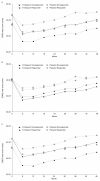Acute bronchodilator responsiveness and health outcomes in COPD patients in the UPLIFT trial
- PMID: 21219660
- PMCID: PMC3027109
- DOI: 10.1186/1465-9921-12-6
Acute bronchodilator responsiveness and health outcomes in COPD patients in the UPLIFT trial
Abstract
Background: Debate continues as to whether acute bronchodilator responsiveness (BDR) predicts long-term outcomes in COPD. Furthermore, there is no consensus on a threshold for BDR.
Methods: At baseline and during the 4-year Understanding Potential Long-term Improvements in Function with Tiotropium (UPLIFT®) trial, patients had spirometry performed before and after administration of ipratropium bromide 80 mcg and albuterol 400 mcg. Patients were split according to three BDR thresholds: ≥ 12% + ≥ 200 mL above baseline (criterion A), ≥ 15% above baseline (criterion B); and ≥ 10% absolute increase in percent predicted FEV1 values (criterion C). Several outcomes (pre-dose spirometry, exacerbations, St. George's Respiratory Questionnaire [SGRQ] total score) were assessed according to presence or absence of BDR in the treatment groups.
Results: 5783 of 5993 randomized patients had evaluable pre- and post-bronchodilator spirometry at baseline. Mean age (SD) was 64 (8) years, with 75% men, mean post-bronchodilator FEV1 1.33 ± 0.44 L (47.6 ± 12.7% predicted) and 30% current smokers. At baseline, 52%, 66%, and 39% of patients had acute BDR using criterion A, B, and C, respectively. The presence of BDR was variable at follow-up visits. Statistically significant improvements in spirometry and health outcomes occurred with tiotropium regardless of the baseline BDR or criterion used.
Conclusions: A large proportion of COPD patients demonstrate significant acute BDR. BDR in these patients is variable over time and differs according to the criterion used. BDR status at baseline does not predict long-term response to tiotropium. Assessment of acute BDR should not be used as a decision-making tool when prescribing tiotropium to patients with COPD.
Figures


References
-
- Rabe KF, Hurd S, Anzueto A, Barnes PJ, Buist SA, Calverley P, Fukuchi Y, Jenkins C, Rodriguez-Roisin R, van Weel C, Zielinski J. Global strategy for the diagnosis, management, and prevention of chronic obstructive pulmonary disease: GOLD executive summary. Am J Respir Crit Care Med. 2007;176:532–555. doi: 10.1164/rccm.200703-456SO. - DOI - PubMed
-
- Anthonisen NR, Wright EC. Bronchodilator response in chronic obstructive pulmonary disease. Am Rev Respir Dis. 1986;133:814–819. - PubMed
-
- American Thoracic Society. Standardization of Spirometry, 1994 Update. Am J Respir Crit Care Med. 1995;152:1107–1136. - PubMed
Publication types
MeSH terms
Substances
LinkOut - more resources
Full Text Sources
Other Literature Sources
Medical

